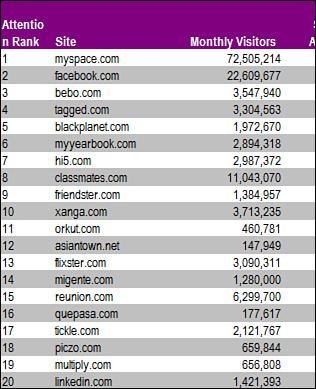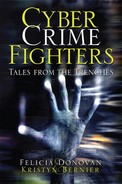Years ago, the only form of social networking that existed on the Internet was bulletin boards that offered lines of green text against a black screen and were perpetually slow and difficult to navigate. Along came high-speed networks that could support photos as well as streaming video and audio, and the world of social networking emerged.
There are so many social networks available today, it is mind-boggling: MySpace, Technorati, Facebook, Xanga, Sconix, Gather—just to name a few. There are topic-specific social networking sites such as Shelfari and GoodReads for book lovers, BlackPlanet for African-Americans, Buzznet for music and culture fans, and Care2 for “green” living enthusiasts. There are literally thousands of different social networking sites that millions of people have joined. We’re going to share with you some of the “darker” sides of social networking that this new frontier hosts.
According to a survey in June of 2007 by Compete.com (shown in Figure 9.1), MySpace had 72 million visitors that month, which made up 12% of the social networking market. Those are pretty staggering numbers—72 million visitors in a single month. But what is even more compelling is the fact that the supposedly “smaller” social networking sites still have millions of visitors each month.
Figure 9.1 This chart from Compete.com measures how much time users spend on a site, compared to the number of total people who use the site, to give a better indicator of what users are viewing.

Just because your children are posting on hi5.com or Friendster.com does not mean they are immune to any danger. Hi5.com reports almost 3 million visitors a month. Friendster has 1.3 million visitors a month. You wouldn’t turn your children loose in a room filled with a hundred strangers, so there’s no reason to not monitor them in a chat room with 3 million strangers.
As social networks proliferate, we’re seeing more and more “specialized” sites, many of which are tailored to specific interests. Surely you’ve heard of MySpace and Facebook, but have you heard of Habbo.com (the “hangout for teens”), Bebo.com, MocoSpace.com, Fubar.com, Twitter.com, Gather.com, Sconex.com (teens), JuicyCampus.com, eCrush.com, CrushorFlush.com, GossipReport.com, eSpintheBottle.com, GaiaOnline.com (for anime fans), or VampireFreaks.com?
We’re not quite sure what to make of the site Rotten Neighbor (www.rottenneighbor.com), which allows and encourages neighbors to leave anonymous posts about each other. The site was founded under the premise that realtors are not allowed to say whether a neighborhood is good, so neighbors do the reporting.
The site also purports to display the locations of known sex offenders. We put in the ZIP Code for the city we work in and the information was inaccurate. Remember that Kristyn’s job is to track known sex offenders. The potential for people thinking someone will not harm their child because of the false security sites like these perpetuate is bothersome. The potential for someone to post something untrue about someone else is enormous.
What does all of this tell you? In addition to a lot of people using social networking sites such as MySpace and Facebook, there is a social networking site, a newsgroup, or a multiuser virtual website for any person with any interest or behavioral tendency. There are infinite opportunities for deviant individuals to network and validate their odd behavior through chatting, blogging, and email. Some of these sites may not be interactive but still provide a justification for the miscreants of society.
Take, for example, NAMBLA. NAMBLA stands for North American Man Boy Love Association. It is exactly what it sounds like—a group of men who want to justify having sex with underage male boys, even infants, calling it consensual and loving. They started in Boston in 1978 and had a newsletter. Thirty years later, they still exist and have an intricate website touting their pedophilic deviance. Years ago, investigators working on cases involving child sexual assaults had difficulty obtaining the NAMBLA newsletter because NAMBLA was almost a type of secret society. Today, anyone can jump on the computer and read about how NAMBLA insists upon the notion that it should be acceptable for men to be in a loving, physical relationship with boys, and that age of consent laws should be changed because the relationship is harmless since the child desires it as well. They hang their hat on the notion that a small child can consent to sex and often will make the first move on an older male. There is even a place on their website where you can join, donate, and become an active member. They are not the only one: www.boylinks.com, an Internet site promoting man-boy love, is similarly stomach turning. They are not difficult to access and are upfront with their messages. Of course, the phrase “child sexual assault” will not be found on their pages as a descriptor of what they are all about—but that is simply semantics. Child sexual assault is really what these groups are all about.
Just as disturbing is the number of sites where one can be guided by strangers on the best way to commit suicide. One site, called alt.suicide.holiday (ASH), has group discussions and guide files with instructions on the various methods one can use to take his or her life. ASH is a newsgroup that was set up in late 1989 allegedly to discuss why suicide rate increase around the holidays. The ASH FAQ spouts their philosophies and tries to justify the site’s purpose; however, the FAQ clearly states, “The ash subculture does not encourage suicide, i.e., we do not persuade people to commit suicide. However we believe that people have a right to commit suicide and thus, in general, do not try to dissuade people from doing so”. They claim that people have the right to choose. They purport to be a support group, but not in the conventional sense—more of a “support platform”. The site states, “If you are seeking a forum aimed at supporting people not to commit suicide, or a forum with the purpose of eliminating suicidal feelings then ash is not for you”. ASH claims to allow visitors to openly discuss feelings and ideas of suicide.
It is possible that the alt.suicide.holiday site may have been linked to numerous suicides. Julia Scheeres wrote a series for Wired in 2003 about cyber suicide, called “Suicide 101: Lessons Before Dying,” an expose of sorts about ASH. She details how one of ASH’s victims, a 24-year-old computer programmer from Ohio, posted a message asking for help on the best way to kill himself because he did not think he would be able to procure a gun. He was given a wide variety of suggestions, but ultimately purchased a shotgun at Wal-Mart and took his life. According to Wired, “No one [on the ASH site] asked him why he wanted to die or tried to change his mind.”
Many parents will say, “My child is not allowed to be on social networking sites or have a MySpace page,” and they think that their children are actually obeying their rules. This naivetè is a huge issue. We have one word for the remedy—awareness. We also have the adage, “Never say, ’My child will never….’”
A lobbyist who works for a prominent social service agency in our state recently met a client for dinner. The conversation steered to MySpace, and the well-educated and in-the-know client made the comment that his 11-year-old son was not allowed to be on MySpace and that he did not have a MySpace page. The lobbyist whipped out her Blackberry and within minutes asked the client, “Is this your son?” Lo and behold, the client’s 11-year-old had his own page under his own name.
Parents are usually very surprised to see their children’s social networking sites appear once they know how to access them. We recommend you start by doing a school or location search and see who pops up.
For those who think this constitutes spying, we wish that they could hear the voices of parents whose children have disappeared, have been violated by online predators, or, as in the following story, have taken their own lives.
Any individual with a bizarre fetish or deviant behavioral tendency can find justification and validation on the Internet—one can remain virtually anonymous, never leave home, and still connect with a potential pool of hundreds of millions of people across the globe. This not only pertains to websites and newsgroups—even Yahoo! and AOL Instant Messenger allow one to go into chat rooms with a wide variety of interests and fetishes. With that many people connecting through cyberspace, success in finding someone who shares a deviant interest is guaranteed.
Many law-enforcement agencies realize the value in watching social networking sites. We’ve had juveniles who claim never to have tried illicit drugs post pictures of themselves smoking pot on their social networking account. These sites have become valuable tools in the course of investigations. Social networking pages are often printed out and reproduced in court. As the old saying goes, “A picture is worth a thousand words”. Going one step further, our Juvenile Court judges are even ordering juveniles to stay off of social networking sites, regardless of what the original juvenile charge was that brought them into court.
Above and beyond law enforcement’s use of social networking sites, it should be noted that many potential employers are now combing social networking sites to see if candidates have a presence. What they say today could come back to haunt them tomorrow, or 5 years from now.
The Federal Trade Commission has some important safety tips to follow when visiting social networking sites. (For more information, visit http://www.ftc.gov/bcp/edu/pubs/consumer/tech/tec14.shtm.)
• Think about how different sites work before deciding to join a site.Some sites will allow only a defined community of users to access posted content; others allow anyone and everyone to view postings.
• Think about keeping some control over the information you post.Consider restricting access to your page to a select group of people—for example, your friends from school, your club, your team, your community groups, or your family.
• Keep your information to yourself.Don’t post your full name, social security number, address, phone number, or bank and credit card account numbers—and don’t post other people’s information, either.
• Be cautious about posting information that could be used to identify you or locate you offline.This could include the name of your school, sports team, clubs, and where you work or hang out.
• Make sure your screen name doesn’t say too much about you.Don’t use your name, your age, or your hometown. Even if you think your screen name makes you anonymous, it doesn’t take a genius to combine clues to figure out who you are and where you can be found.
• Post only information you are comfortable with others seeing—and knowing—about you.Many people can see your page, including your parents, your teachers, the police, the college you might want to apply to next year, or the job you might want to apply for in 5 years.
• Remember that once you post information online, you can’t take it back.Even if you delete the information from a site, older versions exist on other people’s computers.
• Consider not posting your photo.It can be altered and broadcast in ways you may not be happy about. If you do post a picture, ask yourself whether it’s one your mom would display in the living room.
• Flirting with strangers online could have serious consequences.Because some people lie about who they really are, you never really know who you’re dealing with.
• Be wary if a new online friend wants to meet you in person.Before you decide to meet someone, do your research: Ask whether any of your friends know the person, and see what background you can dig up through online search engines. If you decide to meet this person, be smart about it: Meet in a public place, during the day, with friends you trust. Tell an adult or a responsible sibling where you’re going, and when you expect to be back.
• Trust your gut if you have suspicions.If you feel threatened by someone or are uncomfortable because of something online, tell an adult you trust and report it to the police and the social networking site. You could end up preventing someone else from becoming a victim.

